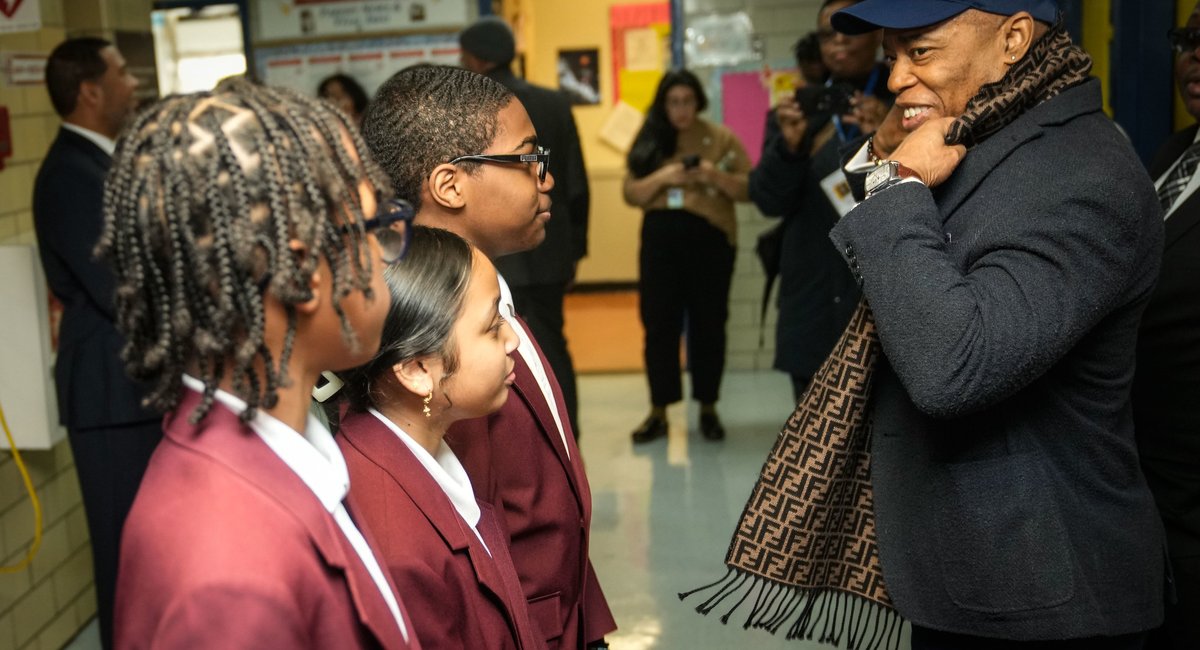State lawmakers are discussing a possible short-term extension of mayoral control of New York City’s school system, though it would come with significant strings attached, according to a key lawmaker in Albany.
State Sen. John Liu, a Queens Democrat who chairs the New York City education committee of the State Senate, confirmed on Monday that mayoral control is back on the table in ongoing discussions on New York’s next budget. Mayoral control is currently due to expire at the end of June, despite Mayor Eric Adams’ opposition to it lapsing.
Gov. Kathy Hochul recently raised the issue again in budget talks, two weeks after legislative leaders all but declared it dead as part of the state’s spending plan, Liu told Gothamist. But he suggested that, if lawmakers agree to extend mayoral control of the city’s schools, it would come with a mechanism to ensure the Adams administration complies with looming class-size restrictions, which state lawmakers approved the last time they extended mayoral control in 2022.
“The mayor wants accountability, and so we’re looking for ways to make him accountable,” Liu said. “The governor has brought up mayoral control in the negotiations, and we’re looking at the issue.”
Adams and his schools chancellor David Banks have strongly advocated for an extension, arguing they should remain in charge of the city’s schools because it’s the best way for them to be held accountable and impose order on the nation’s largest school system. But many educators and parents have called for change, saying the mayor is too far removed from the day-to-day reality of schools.
Hochul included a four-year extension of mayoral control in her $233 billion state budget proposal in January. But legislative leaders signaled by early April that it hadn’t been a serious part of budget negotiations.
Adams’ administration still kept pushing the issue, with Banks traveling to the state Capitol earlier this month to urge lawmakers to consider putting it in the spending plan. “We think we’ve done a great job in rebuilding trust with our families and our communities, and we’ve been delivering real results,” Banks said in Albany on April 2.
Asked a day later whether mayoral control would be in a final budget agreement, Senate Majority Leader Andrea Stewart-Cousins, a Democrat from Yonkers, flatly said “no.”
Now, Liu says any possible extension would include “substantial guarantees” for the city to follow through on the mandates of the state class-size law, a major goal of the United Federation of Teachers union and many New York City parents. Democratic lawmakers are expected to discuss the issue behind closed doors on Monday afternoon.
The law requires a significant reduction of class sizes in the city’s public schools over time. Adams argues the city cannot make those changes without more funding from the state.
When the law is fully implemented, kindergarten through third-grade classes will be capped at 20 students, fourth- through eighth-grade classes will be capped at 23 students, and high-school classes will be capped at 25 students. The city’s Independent Budget Office has estimated that almost 18,000 teachers would need to be hired to meet the mandate, at a cost of up to $1.9 billion per year.
New York City would also have to identify more space for the smaller classrooms. Reducing class sizes is generally popular with parents, but some say they worry about increased competition for certain schools and programs.
The latest talks on another extension of mayoral control come days after the state Education Department released a lengthy review recommending possible reforms. Legislators required the review as part of the 2022 extension of mayoral control, which was for two years.
The nearly 300-page report called for more opportunities for input from families and educators and stronger checks and balances around mayoral control. It noted that New York City currently gives the mayor more power over education than any other school district in the country.
Under that system, the mayor selects the schools chancellor and appoints a majority of members to the Panel for Educational Policy, an oversight board that votes on school-related contracts and other matters. The non-mayoral members are elected by parent councils or appointed by borough presidents, and some of them have said they feel powerless because the mayor appoints most of the panel.
The state Education Department’s report did not ultimately offer clear recommendations on the fate of mayoral control. Instead, it called for a commission to further study the issue.
Meanwhile, lawmakers in Albany continue to negotiate the finer points of the broader state budget, which is expected to total $235 billion once approved. It was due before the start of the state’s fiscal year on April 1, but the Gov. Hochul has struggled to reach consensus with lawmakers on a final deal. Lawmakers have approved four short-term budget extenders to keep the state’s payroll running.
As of Friday, the governor and legislative leaders were closing in on an agreement on the hotly contested issue of housing policy. If a housing deal is reached, that could clear the major remaining hurdle to a final budget. But tenant and landlord advocates aren’t pleased with the emerging deal.
The state Senate and Assembly’s Democratic majorities are expected to hold closed-door conferences on the final remaining issues on Monday afternoon and evening.
